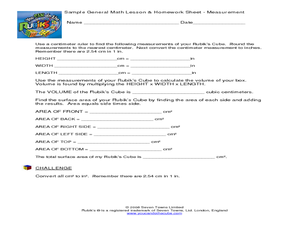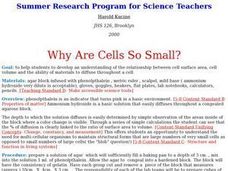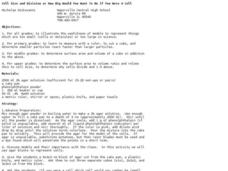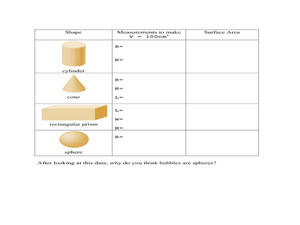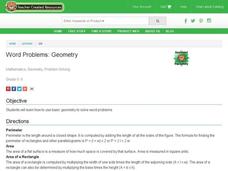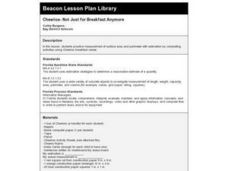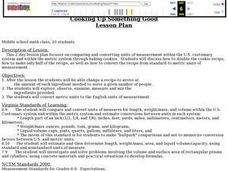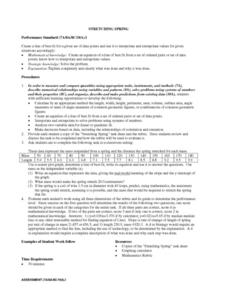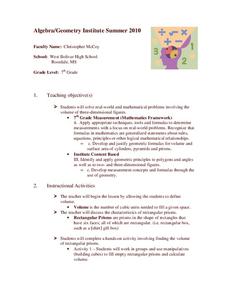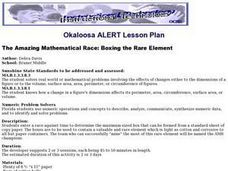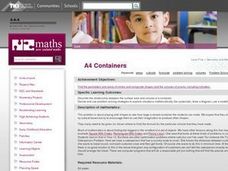Curated OER
Traditional American Indian Lodges
Students explore the mathematical properties of traditional American Indian lodges. They examine the effect of increasing sides of a polygon, calculate the surface area of prisms and cylinders, and construct a classroom size pyramid...
Curated OER
Measurement
Learners measure angles, perimeter, area and volume. In this geometry lesson, students define different ways to measure and solve for the perimeter, area and volume of geometric shapes. They analyze and process information to help them...
Curated OER
Baseball Geometry
Students apply various methods for finding the volume and surface area of sphere. They compare and contrast results among these mathematical methods. They work in cooperative groups to discuss their results with one another.
Curated OER
Worms And More
Students complete five center activities that in order to determine the attributes of length and area. They study the vocabulary associated with measurement of length and area. They use blocks, play dough, wrapping paper, and footprints...
Alabama Learning Exchange
Effects of Friction on a Moving Block
Learners investigate how friction affects the movement of a block across surface areas. They test five different kinds of surfaces—smooth surface, wax paper, a paper towel, course, and fine sandpaper. They predict and record the results...
Curated OER
Get the Turtle to the Pond
Young scholars solve problems. In this math activity, students write solutions using LOGO commands in order to help get the turtle to the pond.
Curated OER
Volumes of Solids of Revolution (Shell Method)
Students find the volume of solids and disks. In this finding the volume of solids and disks lesson, students find the volume using the washer, disk, and shell method. Students integrate functions in terms of x and y. Students use...
Curated OER
Why Are Cells So Small?
Students examine the relationship between cell surface area and the ability of materials to diffuse through a cell. They participate in an experiment in which they determine which materials diffuse easier than others. They complete...
LABScI
Freezing Point Depression: Why Don’t Oceans Freeze?
Can you go ice fishing in the ocean? Learners examine the freezing point of different saltwater solutions. Each solution has a different concentration of salt. By comparing the freezing points graphically, they make conclusions about...
Curated OER
Around the Clock
Middle schoolers discover the relationship between the circumference of a circle and its diameter. They find the length of an arc of a circle.Students use estimation strategies in real-world applications to predict results (i.e.,...
Mathematics Assessment Project
Applying Angle Theorems
Polygon ... an empty bird cage? After finding the angles of a polygon, young mathematicians use the provided methods to solve the problem in multiple ways.
Curated OER
Cell Size and Division or How Big Would You Want To Be if You Were a Cell?
Students investigate why cells divide. In this cell size lesson plan, students observe how far a solution travels into 3 different size model cells of agar. They answer questions about the most effect movement of "nutrients" into the...
Curated OER
Why are Bubbles Spheres
Students calculate the surface area of different polygons. In this geometry lesson, students practice calculating the volume of spheres. They work with cones, cylinders and rectangular prisms.
Curated OER
A Sphere and Its Net
Students identify and sketch the nets for sphere. In this geometry activity, students differentiate between two and three dimensional shapes. They find the surface area of each sphere.
Curated OER
Watershed Investigations
Students explore the components of a watershed and the factors that affect it. They read a topographical map and use geometry to determine the area of a watershed. Students estimate the volume of a body of water and perform runoff...
Curated OER
Word Problems: Geometry
Students solve word problems by using basic geometry. In this geometry lesson, students use geometric formulas to find the perimeter, area, and volume of objects. Students complete a worksheet.
Curated OER
Measurement: 2D and 3D
Students solve volume problems. In this geometry lesson, the class watches a video about clean water (link provided) and individuals compare the volume of different prisms, including an actual drinking glass. Extension activities include...
Curated OER
Cheerios- Not Just for Breakfast Anymore
Second graders measure surface area and perimeter using estimation. They complete a variety of measurement activities using Cheerios breakfast cereal.
Curated OER
Cooking Up Something Good
Students compare and convert units of measurement within the United States customary system and within the metric system by baking cookies. Students discuss how to double the cookie recipe, how to make only half of the recipe, and how to...
Curated OER
STRETCHING SPRING
Students calculate the length, width, height, perimeter, area, volume, surface area, angle measures or sums of angle measures of common geometric figures. They create an equation of a line of best fit from a set of ordered pairs or...
Curated OER
Measurements
Seventh graders solve word problems involving real world situation. For this geometry lesson, 7th graders solve problems related to volume. They apply the formulas taught in geometry.
Curated OER
The Amazing Mathematical Race: Boxing the Rare Element
Students enter a race against time to determine the maximum sized box that can be formed from a standard sheet of copy paper. The boxes are to be used to contain a valuable and rare element which is light as cotton and corrosive to all...
Curated OER
Measuring with Mathematics
Eighth graders discover how the change in the dimensions of a shape cause a change in the overall area of the shape, but the perimeter stay the same. They, in groups, go out to the playground and construct large areas using stakes and rope.
Curated OER
A4 Containers
Fifth graders determine which container made from a single sheet of paper has the greatest volume. They look the solutions made by three different students before working on their own examples.



